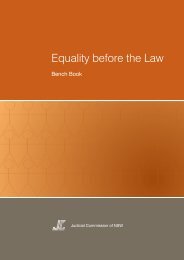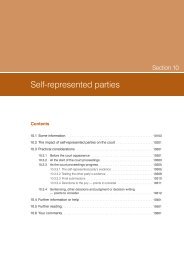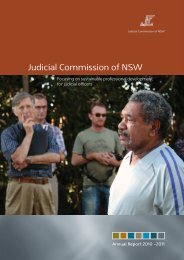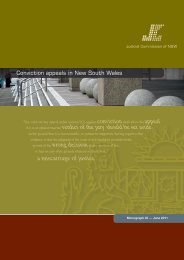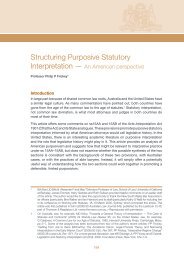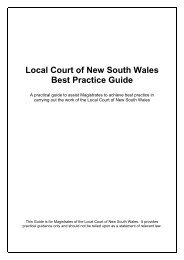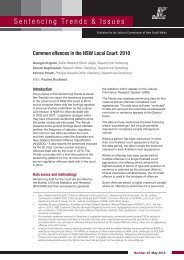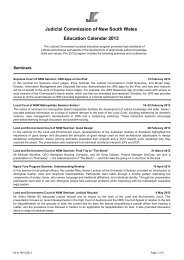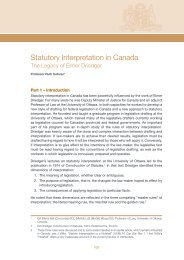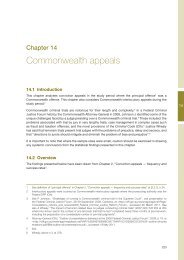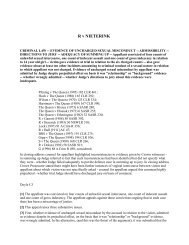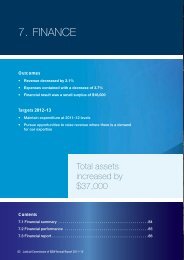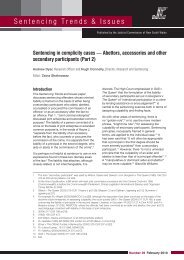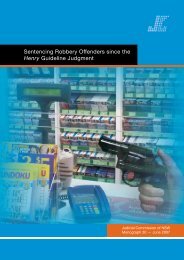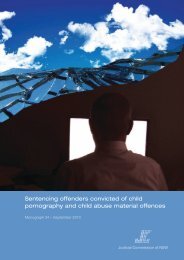Download - Judicial Commission of New South Wales - NSW ...
Download - Judicial Commission of New South Wales - NSW ...
Download - Judicial Commission of New South Wales - NSW ...
You also want an ePaper? Increase the reach of your titles
YUMPU automatically turns print PDFs into web optimized ePapers that Google loves.
Appendices<br />
Appendix 2: Conduct Division: guidelines for examination <strong>of</strong> complaints continued<br />
(d) is there a need to protect a<br />
person who provides information<br />
to the Conduct Division as part <strong>of</strong><br />
its investigation?<br />
(e) would public confidence in the<br />
authority <strong>of</strong> the judiciary be<br />
undermined by a public or private<br />
hearing?<br />
(f) is it necessary to close a hearing<br />
to protect the reputation <strong>of</strong> a<br />
judicial <strong>of</strong>ficer from untested or<br />
unverified evidence?<br />
5.2 Persons who may be present at<br />
private hearings<br />
If a hearing or part <strong>of</strong> a hearing is to<br />
take place in private, the Conduct<br />
Division may determine the persons<br />
who may be present. As a general<br />
guide these may include:<br />
(a) the judicial <strong>of</strong>ficer complained<br />
about<br />
(b) the legal representatives <strong>of</strong> the<br />
judicial <strong>of</strong>ficer<br />
(c) counsel assisting the Conduct<br />
Division<br />
(d) support staff assisting the<br />
Conduct Division<br />
(e) any person referred to in<br />
section 24(6)(b) and their legal<br />
representatives, and<br />
(f) witnesses including expert<br />
witnesses.<br />
5.3 Release <strong>of</strong> information<br />
The Conduct Division has power to<br />
give directions preventing the public<br />
disclosure <strong>of</strong> evidence given at its<br />
hearings (section 36(1)).<br />
5.4 Royal <strong>Commission</strong>s Act 1923<br />
The function <strong>of</strong> the Conduct<br />
Division is to inquire further into the<br />
complaint about the judicial <strong>of</strong>ficer.<br />
In doing so the Conduct Division<br />
has the functions, protections<br />
and immunities conferred by the<br />
Royal <strong>Commission</strong>s Act 1923 on<br />
commissioners appointed under that<br />
Act. The Royal <strong>Commission</strong>s Act<br />
applies to any witness summoned<br />
by or appearing before the Conduct<br />
Division.<br />
5.5 Record <strong>of</strong> proceedings<br />
A transcript <strong>of</strong> proceedings should<br />
be made and kept whenever the<br />
Conduct Division meets as a body<br />
to receive evidence, hear testimony,<br />
or hear the arguments <strong>of</strong> counsel<br />
regarding matters before the Division.<br />
6. Legal representation before the<br />
Conduct Division<br />
6.1 The Attorney General will appoint a<br />
legal practitioner or practitioners to<br />
assist the Conduct Division and to<br />
present the case against the judicial<br />
<strong>of</strong>ficer. This assistance is provided<br />
by senior and junior counsel and a<br />
solicitor (usually the Crown Solicitor).<br />
6.2 The judicial <strong>of</strong>ficer being complained<br />
about will in most instances appear<br />
at the hearing and be represented<br />
by senior and junior counsel and<br />
a solicitor. Funding <strong>of</strong> the legal<br />
representation is subject to approval<br />
by the Attorney General.<br />
6.3 The Conduct Division may also<br />
give permission for other people<br />
including a complainant to appear<br />
at the hearing and have legal<br />
representation.<br />
6.4 The right to legal representation for<br />
persons appearing at a hearing <strong>of</strong><br />
the Conduct Division is a matter<br />
for the discretion <strong>of</strong> the Division.<br />
Consistent with procedural fairness,<br />
the <strong>Commission</strong> is <strong>of</strong> the view, that<br />
as a general guide and wherever it<br />
is practicable to do so, the Conduct<br />
Division should consent to legal<br />
representation for persons appearing<br />
at its hearings.<br />
6.5 In exercising its discretion to consent<br />
to legal representation, the main<br />
criteria the Division should consider<br />
include:<br />
a) is the witness incapable <strong>of</strong><br />
representing him or herself?<br />
b) is the matter likely to affect an<br />
individual’s rights or interest?<br />
c) would the granting <strong>of</strong><br />
representation enhance the<br />
fairness <strong>of</strong> the proceedings?<br />
d) would the proceedings be<br />
conducted with more efficiency<br />
and expedition if representation<br />
were or were not granted?<br />
e) would the cost <strong>of</strong> the Inquiry be<br />
reduced if representation were<br />
granted?<br />
7. Reports<br />
7.1 Report to Governor and others<br />
If the Division has formed an<br />
opinion that the matter could justify<br />
parliamentary consideration <strong>of</strong><br />
the removal <strong>of</strong> the judicial <strong>of</strong>ficer<br />
complained about from <strong>of</strong>fice, it<br />
must present to the Governor a<br />
report setting out its findings <strong>of</strong><br />
fact and that opinion. A copy <strong>of</strong> the<br />
report must also be furnished to the<br />
<strong>Commission</strong>, the Attorney General<br />
and the complainant. The copy to the<br />
complainant is provided only after it<br />
has been laid before each House <strong>of</strong><br />
Parliament.<br />
7.2 Report to the head <strong>of</strong> jurisdiction<br />
If the Division forms an opinion<br />
that the matter is wholly or partly<br />
substantiated but does not justify<br />
parliamentary consideration <strong>of</strong><br />
the removal <strong>of</strong> the judicial <strong>of</strong>ficer<br />
complained about from <strong>of</strong>fice, it<br />
must send a report to the relevant<br />
head <strong>of</strong> jurisdiction setting out its<br />
conclusions. The report may also<br />
include recommendations as to what<br />
steps might be taken to deal with<br />
the complaint. A copy <strong>of</strong> this report<br />
is also provided to the judicial <strong>of</strong>ficer<br />
and the <strong>Commission</strong>.<br />
120 <strong>Judicial</strong> <strong>Commission</strong> <strong>of</strong> <strong>NSW</strong> Annual Report 2010–11



